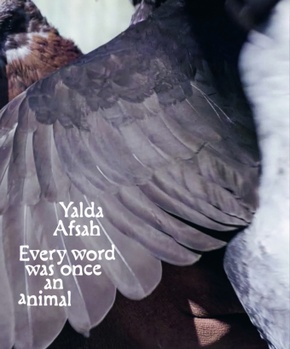
Every word was once an animal - (Deutsch/Englisch)
| Verlag | Distanz Verlag |
| Auflage | 2022 |
| Seiten | 208 |
| Format | 21,5 x 1,5 x 26,0 cm |
| Großformatiges Paperback. Klappenbroschur | |
| Gewicht | 799 g |
| ISBN-10 | 3954764636 |
| ISBN-13 | 9783954764631 |
| Bestell-Nr | 95476463A |
Macht, Fürsorge, Kontrolle
Yalda Afsah (geb. 1983 in Berlin, lebt und arbeitet ebenda) setzt sich in ihren Filmen mit der Beziehung zwischen Mensch und Tier auseinander und befragt Mechanismen von Macht, Fürsorge und Kontrolle in Bezug auf verschiedene Formen von Domestizierung. Sie nimmt die oftmals verschwommenen Grenzen zwischen Pflege, Zuwendung und Identifikation mit Tieren auf der einen und Disziplin, Unterwerfung und menschlicher Dominanz auf der anderen Seite in den Blick. Ihre Arbeiten konfrontieren die Betrachter_innen mit dem intimen Porträt der gegenseitigen Abhängigkeiten menschlicher und nichtmenschlicher Protagonist_innen. Afsah suggeriert dabei nie, dass ein "Zurück" in eine vermeintlich reine Natur möglich sei, sondern provoziert dazu, andere Konzepte des Mit- und Gegeneinanders zu verhandeln. Nach der Teilnahme der deutsch-iranischen Künstlerin an der Manifesta 13, dem New York Film Festival und dem Filmfestival von Locarno bringt die Ausstellung Every word was once an animal alte und neue Produktionen zusammen und beleuchtet die bröckelnde Grenze zwischen Natur und Kultur. Natur ist nicht bloß passiver Gegenstand politischer Einflussnahme, sondern eine widerspenstige Protagonistin des Politischen.
Die begleitende Publikation bietet einen ersten Überblick zu Afsahs Werk. Neben umfassendem Bildmaterial ihrer Videoarbeiten umfasst das Buch Textbeiträge von Fahim Amir, Maurin Dietrich, Cathrin Mayer, Gina Merz und Filipa Ramos.
Power, Care, Control
Yalda Afsah's (b. Berlin, 1983; lives and works in Berlin) films probe the relationship between man and animal, scrutinizing mechanisms of power, care, and control with respect to various forms of domestication and retracing the often blurry boundaries between nurture, solicitousness, and identification with animals on the one hand and discipline, subjugation, and human dominance on the other. Her works confront viewers with an intimate portrait of the mutu al dependencies between human and nonhuman protagonists. Never suggesting that a "return" to an ostensibly pristine nature is possible, Afsah instead prods us to negotiate new conceptions of coexistence and conflict. After the German-Iranian artist's work was featured at Manifesta 13, the New York Film Festival, and the Locarno Film Festival, the exhibition Every word was once an animal gathers older and more recent productions to shed light on the disintegrating boundary between nature and culture. Far from being a mere passive object of political influence, nature is a recalcitrant protagonist to the political.
The accompanying publication provides a first survey of Afsah's growing oeuvre. In addition to extensive visuals from her videos, the book includes writings by Fahim Amir, Maurin Dietrich, Cathrin Mayer, Gina Merz, and Filipa Ramos.
